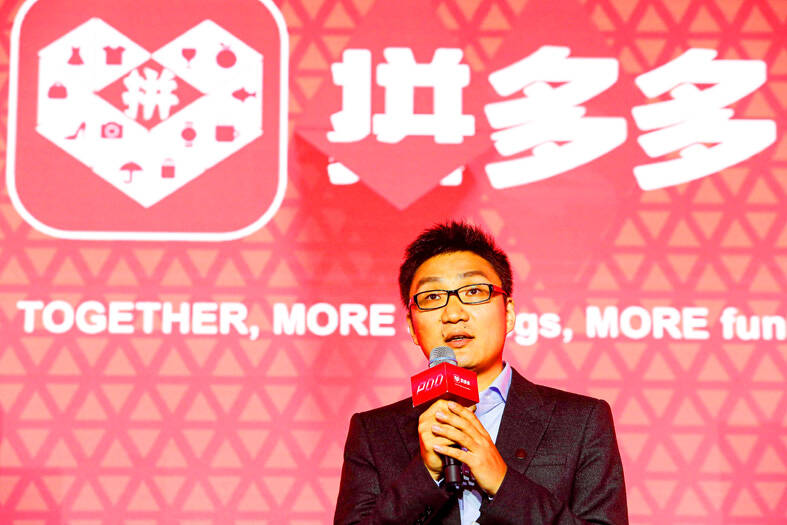E-commerce tycoon Colin Huang (黃崢) has become China’s richest man, an index showed on Friday, capping an ascent for the former Google employee whose shopping site Temu has sucked in consumers with its low prices and powerful algorithms.
Huang, the founder of PDD Holdings Inc (拼多多控股) — which owns Temu and Chinese retail app Pinduoduo (拼多多) — is now worth US$48.6 billion, the Bloomberg Billionaires Index said.
He overtook beverage company Nongfu Spring (農夫山泉) founder Zhong Shanshan (鍾睒睒), who had topped the list since April 2021, as the world’s 25th wealthiest person and the richest in China.

Photo: AFP
Close behind them is tech giant Tencent Holdings Ltd (騰訊) cofounder Ma Huateng (馬化騰), also known as Pony Ma, whose WeChat is often described as China’s “everything app.”
In fourth place is Zhang Yiming (張一鳴), founder of Bytedance Ltd (字節跳動), which owns the massively popular TikTok video-sharing platform.
Huang, born in 1980 in the eastern Chinese city of Hangzhou, was a teenage mathematics whizz and a former employee of Google China. He founded online shopping site Pinduoduo in 2015, which blossomed into one of China’s most successful e-commerce empires — rivaling Jack Ma’s (馬雲) Alibaba Group Holding Ltd (阿里巴巴).
The app lured in consumers with huge discounts and a vast array of products, offering sometimes staggeringly low prices in a fiercely competitive field.
Its overseas iteration Temu launched in 2022 in the US, where it amassed a loyal consumer base with ultra-low-cost goods made and shipped from China.
Temu’s success dovetailed with persistently high inflation that has pushed cost-conscious consumers to hunt for bargains, and it has since taken off in Europe, Latin America and elsewhere.
Despite only arriving in Europe last year, Temu has said it has on average about 75 million monthly active users in the region.
However, its massive success had drawn accusations of unfair commercial practices and lax safety standards.
This year, consumer groups in Europe said Temu was manipulating shoppers into spending more money, distorting their ability to make “free and informed decisions.”
In April, South Korean regulators opened an investigation into Temu on suspicion of false advertising and unfair practices.
Last month, hundreds of merchants in China demonstrated at an affiliated office in the southern city of Guangzhou, alleging unfair treatment in the sale of their products on the platform.
However, that has done little to dent the success of the firm, with PDD Holdings announcing in May that first-quarter net profit had more than tripled year-on-year.
The firm’s US-listed shares closed at US$138.02 apiece on Thursday, giving it a market capitalization of US$191.68 billion.

Sweeping policy changes under US Secretary of Health and Human Services Robert F. Kennedy Jr are having a chilling effect on vaccine makers as anti-vaccine rhetoric has turned into concrete changes in inoculation schedules and recommendations, investors and executives said. The administration of US President Donald Trump has in the past year upended vaccine recommendations, with the country last month ending its longstanding guidance that all children receive inoculations against flu, hepatitis A and other diseases. The unprecedented changes have led to diminished vaccine usage, hurt the investment case for some biotechs, and created a drag that would likely dent revenues and

Global semiconductor stocks advanced yesterday, as comments by Nvidia Corp chief executive officer Jensen Huang (黃仁勳) at Davos, Switzerland, helped reinforce investor enthusiasm for artificial intelligence (AI). Samsung Electronics Co gained as much as 5 percent to an all-time high, helping drive South Korea’s benchmark KOSPI above 5,000 for the first time. That came after the Philadelphia Semiconductor Index rose more than 3 percent to a fresh record on Wednesday, with a boost from Nvidia. The gains came amid broad risk-on trade after US President Donald Trump withdrew his threat of tariffs on some European nations over backing for Greenland. Huang further

CULPRITS: Factors that affected the slip included falling global crude oil prices, wait-and-see consumer attitudes due to US tariffs and a different Lunar New Year holiday schedule Taiwan’s retail sales ended a nine-year growth streak last year, slipping 0.2 percent from a year earlier as uncertainty over US tariff policies affected demand for durable goods, data released on Friday by the Ministry of Economic Affairs showed. Last year’s retail sales totaled NT$4.84 trillion (US$153.27 billion), down about NT$9.5 billion, or 0.2 percent, from 2024. Despite the decline, the figure was still the second-highest annual sales total on record. Ministry statistics department deputy head Chen Yu-fang (陳玉芳) said sales of cars, motorcycles and related products, which accounted for 17.4 percent of total retail rales last year, fell NT$68.1 billion, or

MediaTek Inc (聯發科) shares yesterday notched their best two-day rally on record, as investors flock to the Taiwanese chip designer on excitement over its tie-up with Google. The Taipei-listed stock jumped 8.59 percent, capping a two-session surge of 19 percent and closing at a fresh all-time high of NT$1,770. That extended a two-month rally on growing awareness of MediaTek’s work on Google’s tensor processing units (TPUs), which are chips used in artificial intelligence (AI) applications. It also highlights how fund managers faced with single-stock limits on their holding of market titan Taiwan Semiconductor Manufacturing Co (TSMC, 台積電) are diversifying into other AI-related firms.